
Taiwan, officially the Republic of China (ROC), is a country in East Asia. The main island of Taiwan, also known as Formosa, lies between the East and South China Seas in the northwestern Pacific Ocean, with the People's Republic of China (PRC) to the northwest, Japan to the northeast, and the Philippines to the south. It has an area of 35,808 square kilometres, with mountain ranges dominating the eastern two-thirds and plains in the western third, where its highly urbanized population is concentrated. The combined territories under ROC control consist of 168 islands in total covering 36,193 square kilometres. The largest metropolitan area is formed by Taipei, New Taipei City, and Keelung. With around 23.9 million inhabitants, Taiwan is among the most densely populated countries.
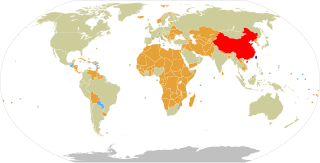
Foreign relations of the Republic of China (ROC), more commonly known as Taiwan, are accomplished by efforts of the Ministry of Foreign Affairs of the Republic of China, a cabinet-level ministry of the Government of the Republic of China. It currently has formal diplomatic relations with 11 of the 193 United Nations member states and with the Holy See, which governs the Vatican City State, as of 6 July 2024. In addition to these relations, the ROC also maintains unofficial relations with 59 UN member states, one self-declared state (Somaliland), three territories (Guam, Hong Kong, and Macau), and the European Union via its representative offices and consulates. In 2021, the Government of the Republic of China had the 33rd largest diplomatic network in the world with 110 offices.
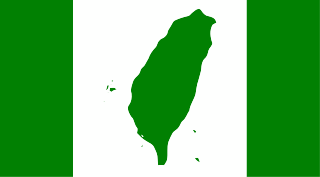
The Taiwan independence movement is a political movement which advocates the formal declaration of an independent and sovereign Taiwanese state, as opposed to Chinese unification or the status quo in Cross-Strait relations.
The controversy surrounding the political status of Taiwan or the Taiwan issue is an ongoing dispute on the political status of Taiwan, currently controlled by the Republic of China (ROC). This dispute arose in the mid-twentieth century.
One China is a phrase describing the international relationship between the People's Republic of China (PRC), situated on the Chinese Mainland, and the Republic of China (ROC), commonly known as Taiwan. "One China" asserts that there is only one de jure Chinese nation despite the de facto division between the two rival governments in the aftermath of the Chinese Civil War. The term may refer, in alphabetical order, to one of the following:
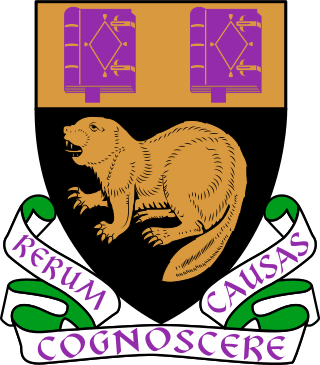
The London School of Economics and Political Science (LSE) is a public research university in London, England, and a member institution of the University of London. The school specialises exclusively in the social sciences, including economics, politics, sociology, law and anthropology. Founded in 1895 by Fabian Society members Sidney Webb, Beatrice Webb, Graham Wallas and George Bernard Shaw, LSE joined the University of London in 1900 and established its first degree courses under the auspices of the university in 1901. LSE began awarding its degrees in its own name in 2008, prior to which it awarded degrees of the University of London. It became a university in its own right within the University of London in 2022.

Mark Wallinger is an English artist. Having previously been nominated for the Turner Prize in 1995, he won in 2007 for his installation State Britain. His work Ecce Homo (1999–2000) was the first piece to occupy the empty fourth plinth in Trafalgar Square. He represented Britain at the Venice Biennale in 2001. Labyrinth (2013), a permanent commission for Art on the Underground, was created to celebrate 150 years of the London Underground. In 2018, the permanent work Writ in Water was realized for the National Trust to celebrate where Magna Carta was signed at Runnymede.
"Chinese Taipei" is the term used in various international organizations and tournaments for groups or delegations representing the Republic of China (ROC), a country commonly known as Taiwan.
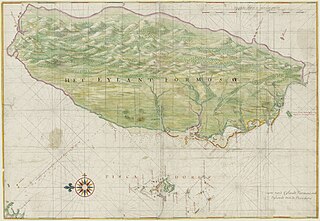
As a result of the surrender and occupation of Japan at the end of World War II, the islands of Taiwan and Penghu were placed under the governance of the Republic of China (ROC), ruled by the Kuomintang (KMT), on 25 October 1945. Following the February 28 massacre in 1947, martial law was declared in 1949 by the Governor of Taiwan, Chen Cheng, and the ROC Ministry of National Defense. Following the end of the Chinese Civil War in 1949, the ROC government retreated from the mainland as the Chinese Communist Party (CCP) proclaimed the establishment of the People's Republic of China. The KMT retreated to Taiwan and declared Taipei the temporary capital of the ROC. For many years, the ROC and PRC each continued to claim in the diplomatic arena to be the sole legitimate government of "China". In 1971, the United Nations expelled the ROC and replaced it with the PRC.

The Taipei Economic and Cultural Representative Office (TECRO), also known as Taipei Economic and Cultural Office (TECO), Taipei Representative Office (TRO) or Taipei Mission, is an alternative diplomatic institution serving as a de facto embassy or a consulate of the Republic of China to exercise the foreign affairs and consular services in specific countries which have established formal diplomatic relations with the People's Republic of China. The PRC denies the legitimacy of the ROC as a sovereign state and claims the ROC-controlled territories as an integral part of its territory. An exclusive mandate, namely One-China policy, requires that any country wishing to establish a diplomatic relationship with the PRC must first sever any formal relationship with the ROC. According to The Fletcher Forum of World Affairs, "non-recognition of the Taiwanese government is a prerequisite for conducting formal diplomatic relations with the PRC—in effect forcing other governments to choose between Beijing and Taipei." As a result, these countries only allow the ROC to establish representative offices instead of a fully-fledged embassy or consulate for the purpose of conducting practical bilateral relations without granting full diplomatic recognition.

Cross-strait relations are the political and economic relations between Mainland China and Taiwan across the Taiwan Strait.
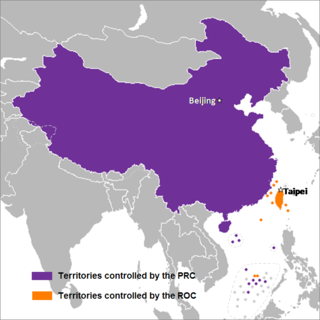
"Taiwan, China", "Taiwan, Province of China", and "Taipei, China" are controversial political terms that claim Taiwan and its associated territories as a province or territory of the People's Republic of China.
Observer status is a privilege granted by some organizations to non-members to give them an ability to participate in the organization's activities. Observer status is often granted by intergovernmental organizations (IGO) to non-member parties and international nongovernmental organizations (INGO) that have an interest in the IGO's activities. Observers generally have a limited ability to participate in the IGO, lacking the ability to vote or propose resolutions.

The term "Two Chinas" refers to the geopolitical situation where two political entities exist under the name "China".

The Republic of China (ROC) took part in the opening ceremony of the 1924 Summer Olympics, but its four athletes, all of whom were tennis players, withdrew from competition. The ROC participated in its first Olympic Games in 1932 under the name of China. After the World War II, the ROC competed at the 1948 Summer Olympics. The ROC delegation at the 1948 Summer Games is the only ROC delegation composed of athletes from both mainland China and island of Taiwan in Olympic history. In 1932 and 1936, athletes from the island of Taiwan competed as part of the team of Japan.
India–Taiwan relations, also known as the Indo–Taiwanese relations, are the bilateral relations between the Republic of India and the Republic of China (Taiwan). The two nations maintain a dynamic and evolving relationship that, while unofficial, is marked by significant economic, technological, and strategic interactions. The trade relationship between the two has seen notable growth, with bilateral trade reaching around $7 billion in 2022. This economic partnership is largely centered on electronics, machinery, and chemicals, with Taiwanese companies like Foxconn establishing manufacturing facilities in India, particularly in the electronics sector.

Canada and Taiwan have maintained unofficial bilateral relations since 1970. First contacts between Canada and Taiwan began in 1871 with the arrival of George Leslie Mackay.

Haiti–Taiwan relations or ROC–Haitian relations refer to the bilateral relations between the Republic of Haiti and Republic of China (Taiwan). Haiti maintains an embassy in Taipei and Taiwan maintains an embassy in Port-au-Prince.

Taiwan–European Union relations refers to the international relations between Taiwan, and the European Union (EU).















